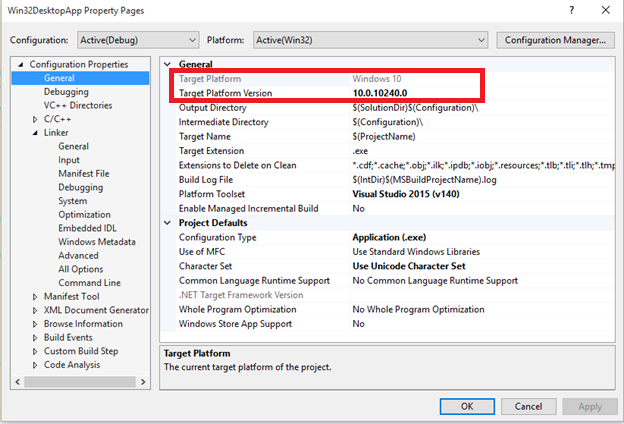How to Call the Windows Runtime Component in Standard C++
#1 Create a new Win32 Console Project (named it Win32DesktopApp)
#2 Change the target platform to Window 10
#3 Add “WindowsApp.lib” to “Additional Dependencies” in Linker -> Input.
Code:
#include "stdafx.h"
#include <Windows.Foundation.h>
#include <wrl\wrappers\corewrappers.h>
#include <wrl\client.h>
#include <iostream>
#include <sstream>
using namespace std;
using namespace ABI::Windows::Foundation;
using namespace Microsoft::WRL;
using namespace Microsoft::WRL::Wrappers;
int main()
{
// Initialize the Windows Runtime.
RoInitializeWrapper initialize(RO_INIT_MULTITHREADED);
if (FAILED(initialize))
{
cout << "Failed to initialize";
}
// Get the activation factory for the IUriRuntimeClass interface.
ComPtr<IUriRuntimeClassFactory> uriFactory;
HRESULT hr = GetActivationFactory(HStringReference(RuntimeClass_Windows_Foundation_Uri).Get(), &uriFactory);
if (FAILED(hr))
{
cout << "failed to activate the Windows Runtime Class Factory";
return 0;
}
// Create a string that represents a URI.
HString uriHString;
hr = uriHString.Set(L"https://www.microsoft.com");
if (FAILED(hr))
{
cout << "failed to wrapper the string";
return 0;
}
// Create the IUriRuntimeClass object.
ComPtr<IUriRuntimeClass> uri;
hr = uriFactory->CreateUri(uriHString.Get(), &uri);
if (FAILED(hr))
{
cout << "failed to create a runtime instance";
return 0;
}
// Get the domain part of the URI.
HString domainName;
hr = uri->get_Domain(domainName.GetAddressOf());
if (FAILED(hr))
{
cout << "failed to call method get_Domain";
return 0;
}
wprintf_s(L"Domain name: %s\n", domainName.GetRawBuffer(nullptr));
return 0;
}
Comments
- Anonymous
August 05, 2015
The comment has been removed

